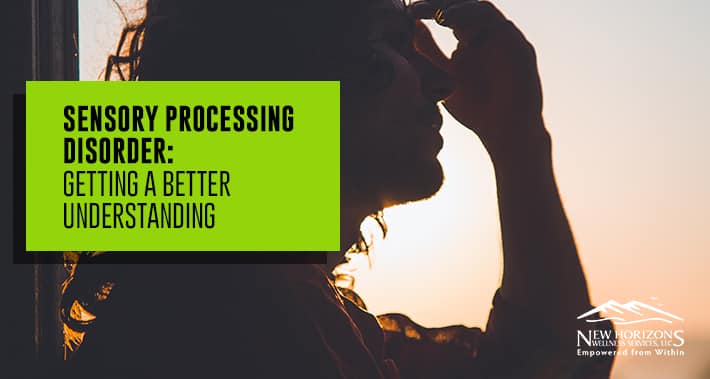
Here at New Horizons Wellness Services, we offer treatments for a variety of different health disorders.
Some of them, like ADHD and autism spectrum disorder, may be household names, but others are not.
But while certain disorders may seem more obscure, they’re still common enough to affect a large number of people.
Today we’ll be exploring sensory processing disorder.
Once you read this article, you’ll have a better understanding of sensory processing disorder, including what it is, how to recognize its symptoms, and how occupational therapy can help children as well as adults who have it.
Keep reading to find out more.
Sensory Processing Disorder: What Is It?
Sensory processing disorder is a neurological disorder that has to do with, not surprisingly, how you process sensory input. Sensory input refers to any information your senses send to your brain.
Think of this like the traditional five senses – things you touch, hear, see, taste, and smell – though modern science has discovered there are actually eight senses.
Someone with sensory processing disorder isn’t able to organize the information that comes to them in the same way as a neurotypical person.
The information they sense is accurate, but they may poorly detect, modulate, or interpret the information, leading to an “atypical” behavioral response.
Is Sensory Processing Disorder The Same As A Sensory Impairment?
No, not necessarily.
It’s possible for someone to have both sensory processing disorder and a sensory impairment.
For example, someone with nearsightedness (a visual impairment) may also have an inability to process the information when watching a pedestrian crossing the street in a busy intersection (sensory impairment).
However, they’re not necessarily correlated.
If you have sensory processing disorder, the problem isn’t rooted in your sensory receptors, but how your brain processes the information your senses send to it.
When your brain receives the information, it has a difficult time organizing it, which can lead to inappropriate responses to the input.
Sensory Processing Disorder: What Are The Symptoms?
The symptoms of sensory processing disorder may be different due to a number of different factors.
These can include age, past experiences or trauma, and environment as well as the type of sensory processing disorder that you have.
Let’s take a look at how SPD may present in some of the following age groups.
Sensory Processing Disorder Symptoms In Babies
If your baby has sensory processing disorder, they may display the following symptoms:
- Preference to remain unclothed
- Insomnia
- Slow to respond to pain
- Reluctance to play with toys
- Seems to dislike human contact/cuddling
- Easily startled
- Overactive, always moving
- Little or no vocalizations
- Is late or very early in learning to crawl, talk stand, or walk

Sensory Processing Disorder Symptoms In Preschool-Age Children
If your preschool-age child has sensory processing disorder, they may display the following symptoms:
- Difficulty with potty training
- Is an overly picky eater
- Overly sensitive to stimuli (noises such as toilets or hair dryers, or types of fabric)
- Difficulty learning new motor skills
- Clumsy or frequently loses balance
- Constantly moving such as running, climbing or jumping
- Feels the need to touch everything
- Sudden mood changes
- Frequent temper tantrums
- Difficulty understanding instructions
- Difficulty making friends
Sensory Processing Disorder Symptoms In School-Age Children
If your school-age child has sensory processing disorder, they may display the following symptoms:
- Being easily distracted in the classroom
- Lacks awareness of personal space
- Doesn’t like staying in their seat
- Slow to perform tasks or is overly fast
- Likes playing rough or is overly sensitive to touch
- Overreacts to stimulation (easily car sick, get upset when there are bright lights)
- Has difficulty changing focus from one task to another
- Confuses words that sound similar
- Difficulty reading
- Has difficulty learning new motor skills (handwriting, playing on playground equipment)
- Has difficulty making new friends
Sensory Processing Disorder Symptoms In Adults
Sensory processing disorder is not the type of condition you “grow out of”.
As a result, adults can be affected by this disorder as well.
If you’ve dealt with the following symptoms in your life, and never understood why, it may be rooted in sensory processing disorder.
- Being overly sensitive to stimuli
- Disliking physical contact
- Waking up feeling tired/lethargic
- Beginning several tasks at once and not completing any of them
- Being clumsy
- Difficulty sitting still
- Difficulty focusing on a task
- Difficulty absorbing what you read
- Being absent minded when needing to focus for a long time in classes or meetings
- Difficulty dealing with stress or becoming overstimulated
What Causes Sensory Processing Disorder?
At this point, we don’t know exactly what causes sensory processing disorder.
However, it may be related to either issues stemming from your time in utero, or a genetic predisposition.
Occupational Therapy For Sensory Processing Disorder
If, having read the above symptoms, you recognize either yourself or your child in them, there is hope.
Your occupational therapist can work directly with you or your child to explore your different roles in life.
For children, that’s often simpler – friend, student, child, and maybe sibling are the roles they most commonly hold.
Adults, though, lead more complex lives.
Your roles in life may include any of the above, plus parent, family member, professional, caregiver, business owner, coworker, and more.
By getting a better understanding of these roles, your occupational therapist will be able to understand your or your child’s responsibilities.
From there, your occupational therapist will help you with coping techniques – a combination of practical skills and mental health practices – to improve your quality of life.
Occupational Therapy For Children With Sensory Processing Disorder
If your child has sensory processing disorder, their occupational therapist will treat them in a sensory-rich environment sometimes called an “OT gym.”
During sessions, your occupational therapist will guide your child through fun activities that are very subtle, but challenging.
The goal of occupational therapy is to foster appropriate responses to sensations in an active, meaningful, and fun way so your child can gain functional skills.
Over time, your child will incorporate these appropriate responses into their environments beyond the clinic to include school, home, and the larger community.
Occupational Therapy For Adults With Sensory Processing Disorder
If you’re an adult with sensory processing disorder, your occupational therapist will help you through:
- Providing education
- Intervention through specific sensory techniques
- Identifying environmental or task modifications
- Positive coping techniques
Once you receive treatment for your sensory issues, your understanding of how to cope with your condition grows.
With direct treatment, changes in the way sensation is perceived take place.
You and your therapist will work together to identify triggers for avoiding or decreasing the intensity of those relationships and situations that cause failure and lead to anxiety and depression.
Contact New Horizons Wellness Services
At the time of this writing, there is no known cure for sensory processing disorder.
For those who have it, though, there is hope.
Occupational therapy treatments at New Horizons Wellness Services can help you better manage your sensory processing disorder and improve your quality of life.
To find out more, contact New Horizons Wellness Services today.
Sensory processing disorder can be a frustrating condition to deal with, but occupational therapy treatments can make it easier.
Contact New Horizons Wellness Services to find out how, today.
Yours in Health,
New Horizons Wellness Services13333 SW 68th Pkwy,
Tigard, OR 97223
- https://g.page/newhws
New Horizons Wellness Services provides a true multidisciplinary approach to mental & physical health treatments for children, adults and families.
